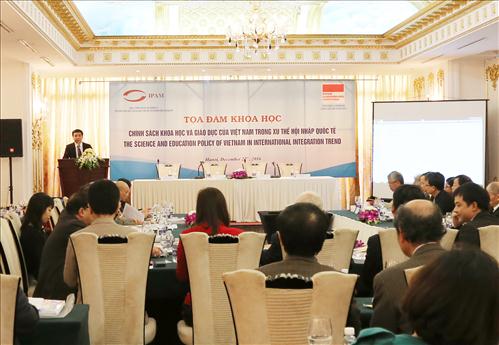

Attending the discussion were Ms. Nguyen Thanh Hai - Member of the Party Central Committee, Member of the National Assembly Standing Committee, Head of the National Assembly's Petition Committee; Mr. Nguyen Duc Kien - Deputy Chairman of the National Assembly's Economic Committee, Chairman of the Vietnam - Germany Friendship Parliamentarians' Group; Mr. Pham Dai Duong - Deputy Minister of Science and Technology; and leaders, former leaders of the National Assembly, Ministries, Central agencies and Hanoi City; representatives of foreign embassies in Hanoi.
The Organizing Committee received more than 30 papers from domestic and international scientists and selected 12 reports to present at 2 working sessions.
In his opening speech at the seminar, in addition to emphasizing the impacts of the fourth industrial revolution on the world and Vietnam, Vice President of the University of Social Sciences and Humanities Nguyen Van Kim said, “For many years, Vietnam has always emphasized the view that education and training together with science and technology are the top national policies, the driving force of the development process, investment in education is investment for development. The Resolution of the 12th National Party Congress affirmed to continue to strongly and synchronously innovate the basic elements of education and training; innovate educational programs and content; diversify content and learning materials to meet the requirements of all levels of education, educational programs, training and the lifelong learning needs of everyone”.
From that meaning, the seminar will analyze in depth a broad topic of policy and the role of science and technology, education and training in the trend of international integration of Vietnam. This seminar will also be an opportunity for managers, domestic and international scholars to present their research results, listen and exchange experiences on topics of common interest.
Main topics at the seminar: (1) Identifying philosophies and viewpoints in Vietnam's science and education policies before and during the renovation period; (2) Achievements and limitations in implementing science policies in Vietnam today; (3) Achievements and limitations in implementing education policies in Vietnam today; (4) Opportunities and challenges in planning and implementing Vietnam's science and education policies in the context of integration; (5) Philosophy and orientation of science development in the context of international integration; (6) Philosophy of education development in the direction of fundamental and comprehensive innovation in the context of international integration; (7) International experience in transforming science and education policies in the globalization trend; (8) The role of science and technology organizations in the process of transforming science policies in Vietnam: current situation and solutions; (9) The role of science and education in promoting the industrialization and modernization process of Vietnam; (10) The role of science in innovation and promoting educational development.
After the opening session, delegates listened to and discussed reports at two working sessions.

Associate Professor, Dr. Dao Thanh Truong - Head of the Faculty of Management Science, Deputy Director of the Institute of Policy and Management (University of Social Sciences and Humanities) spoke at the seminar


|
Step 1, identify the current situation to perceive whether science and education are evolving in a direction consistent with the general development laws of the world or not. Step 2, promote development according to the world's common model. It is a system in which science, education and production exist in an organically linked organizational institution. Step 3, join the world education revolution: develop research and development (R&D) organizations in production; develop R&D organizations in universities; develop undergraduate and postgraduate training at academies as is happening, gradually convert some academies into academies, both training and research.
|
Sinh Vu - VNU Media
Author:Sinh Vu - VNU Media
Newer news
Older news